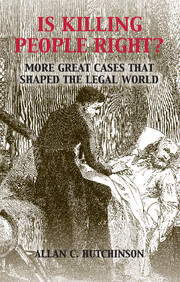Book contents
- Frontmatter
- Dedication
- Contents
- List of figures
- Preface
- 1 Introduction: on the road (again)
- 2 Is killing people right?: law and the end of life
- 3 Oil on troubled waters: the consequences of civil liability
- 4 The politics of law: cats, pigeons and old chestnuts
- 5 The companies we keep: the moralities of business
- 6 Fifty shades of Brown: consent and the criminal law
- 7 Putting up a defence: sex, murder and videotapes
- 8 Wade-ing into controversy: a case of accidental activism
- 9 Playing a different tune: fairness in deal making
- 10 Conclusion: surfing the tides
- Sources
- Index
- References
5 - The companies we keep: the moralities of business
Published online by Cambridge University Press: 05 May 2016
- Frontmatter
- Dedication
- Contents
- List of figures
- Preface
- 1 Introduction: on the road (again)
- 2 Is killing people right?: law and the end of life
- 3 Oil on troubled waters: the consequences of civil liability
- 4 The politics of law: cats, pigeons and old chestnuts
- 5 The companies we keep: the moralities of business
- 6 Fifty shades of Brown: consent and the criminal law
- 7 Putting up a defence: sex, murder and videotapes
- 8 Wade-ing into controversy: a case of accidental activism
- 9 Playing a different tune: fairness in deal making
- 10 Conclusion: surfing the tides
- Sources
- Index
- References
Summary
‘A good reputation is more valuable than money’.
Publilius SyrusTrade and commerce are as old as society itself. People have bartered and sought to enrich themselves for millennia. In seeking ever more efficient and profitable ways to do that, various schemes and structures have been imaginatively devised. The most common initiative has been for traders and entrepreneurs to band together in partnerships in the hope of obtaining a collective advantage. However, the idea of a ‘corporation’ as we know it today was a long time coming. The corporation has its roots in Roman law (and is derivative of the Latin corporare for ‘form into a body’) and the state-sponsored colonial organisations of the seventeenth century, like The East India Company and The Hudson's Bay Company. But the recognition of a collective entity or institution that warranted a distinct identity and legal persona independent of its participating members is of relatively recent origin.
In the British Commonwealth, the nineteenth century English case of Salomon is considered to have cemented the place of the modern corporation at the centre of today's social and commercial life. Somewhat incongruously, this celebrated precedent begins in the filthy backstreets of Dickensian London where the Salomon family struggled to keep its boot-making business afloat. From these decidedly humble and dubious beginnings, the laws of corporate governance have developed to facilitate the immense growth and influential presence of today's megacorporations. Much has been attributed to the Salomon decision's important role in establishing the identity of the corporation as a legal entity separate from its (founding) owners and imposing a veil between the corporation and its shareholders.
Yet, upon closer inspection, the whole Salomon saga is revealed to be about much less and much more. It is more helpfully understood as a decision that is less about the legal consequences of incorporation and more about the morality of business practices. How do we handle the keeping of moral obligations to others when doing so will result in catastrophic consequences for ourselves? Consequently, in revisiting the case of Salomon, it is illuminating to tackle the more broader and more ambitious question of the vexing relationship between legal principles and moral obligations in a commercial world.
- Type
- Chapter
- Information
- Is Killing People Right?More Great Cases that Shaped the Legal World, pp. 60 - 79Publisher: Cambridge University PressPrint publication year: 2016



